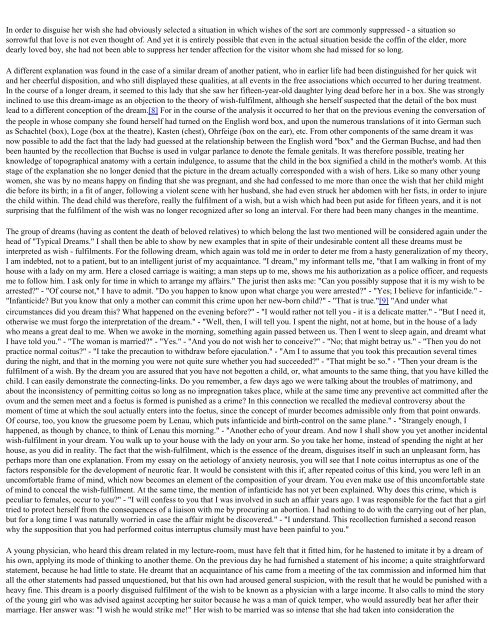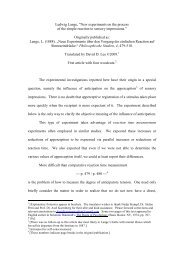The Interpretation Of Dreams Sigmund Freud (1900) PREFACE
The Interpretation Of Dreams Sigmund Freud (1900) PREFACE
The Interpretation Of Dreams Sigmund Freud (1900) PREFACE
You also want an ePaper? Increase the reach of your titles
YUMPU automatically turns print PDFs into web optimized ePapers that Google loves.
In order to disguise her wish she had obviously selected a situation in which wishes of the sort are commonly suppressed - a situation so<br />
sorrowful that love is not even thought of. And yet it is entirely possible that even in the actual situation beside the coffin of the elder, more<br />
dearly loved boy, she had not been able to suppress her tender affection for the visitor whom she had missed for so long.<br />
A different explanation was found in the case of a similar dream of another patient, who in earlier life had been distinguished for her quick wit<br />
and her cheerful disposition, and who still displayed these qualities, at all events in the free associations which occurred to her during treatment.<br />
In the course of a longer dream, it seemed to this lady that she saw her fifteen-year-old daughter lying dead before her in a box. She was strongly<br />
inclined to use this dream-image as an objection to the theory of wish-fulfilment, although she herself suspected that the detail of the box must<br />
lead to a different conception of the dream.[8] For in the course of the analysis it occurred to her that on the previous evening the conversation of<br />
the people in whose company she found herself had turned on the English word box, and upon the numerous translations of it into German such<br />
as Schachtel (box), Loge (box at the theatre), Kasten (chest), Ohrfeige (box on the ear), etc. From other components of the same dream it was<br />
now possible to add the fact that the lady had guessed at the relationship between the English word "box" and the German Buchse, and had then<br />
been haunted by the recollection that Buchse is used in vulgar parlance to denote the female genitals. It was therefore possible, treating her<br />
knowledge of topographical anatomy with a certain indulgence, to assume that the child in the box signified a child in the mother's womb. At this<br />
stage of the explanation she no longer denied that the picture in the dream actually corresponded with a wish of hers. Like so many other young<br />
women, she was by no means happy on finding that she was pregnant, and she had confessed to me more than once the wish that her child might<br />
die before its birth; in a fit of anger, following a violent scene with her husband, she had even struck her abdomen with her fists, in order to injure<br />
the child within. <strong>The</strong> dead child was therefore, really the fulfilment of a wish, but a wish which had been put aside for fifteen years, and it is not<br />
surprising that the fulfilment of the wish was no longer recognized after so long an interval. For there had been many changes in the meantime.<br />
<strong>The</strong> group of dreams (having as content the death of beloved relatives) to which belong the last two mentioned will be considered again under the<br />
head of "Typical <strong>Dreams</strong>." I shall then be able to show by new examples that in spite of their undesirable content all these dreams must be<br />
interpreted as wish - fulfilments. For the following dream, which again was told me in order to deter me from a hasty generalization of my theory,<br />
I am indebted, not to a patient, but to an intelligent jurist of my acquaintance. "I dream," my informant tells me, "that I am walking in front of my<br />
house with a lady on my arm. Here a closed carriage is waiting; a man steps up to me, shows me his authorization as a police officer, and requests<br />
me to follow him. I ask only for time in which to arrange my affairs." <strong>The</strong> jurist then asks me: "Can you possibly suppose that it is my wish to be<br />
arrested?" - "<strong>Of</strong> course not," I have to admit. "Do you happen to know upon what charge you were arrested?" - "Yes; I believe for infanticide." -<br />
"Infanticide? But you know that only a mother can commit this crime upon her new-born child?" - "That is true."[9] "And under what<br />
circumstances did you dream this? What happened on the evening before?" - "I would rather not tell you - it is a delicate matter." - "But I need it,<br />
otherwise we must forgo the interpretation of the dream." - "Well, then, I will tell you. I spent the night, not at home, but in the house of a lady<br />
who means a great deal to me. When we awoke in the morning, something again passed between us. <strong>The</strong>n I went to sleep again, and dreamt what<br />
I have told you." - "<strong>The</strong> woman is married?" - "Yes." - "And you do not wish her to conceive?" - "No; that might betray us." - "<strong>The</strong>n you do not<br />
practice normal coitus?" - "I take the precaution to withdraw before ejaculation." - "Am I to assume that you took this precaution several times<br />
during the night, and that in the morning you were not quite sure whether you had succeeded?" - "That might be so." - "<strong>The</strong>n your dream is the<br />
fulfilment of a wish. By the dream you are assured that you have not begotten a child, or, what amounts to the same thing, that you have killed the<br />
child. I can easily demonstrate the connecting-links. Do you remember, a few days ago we were talking about the troubles of matrimony, and<br />
about the inconsistency of permitting coitus so long as no impregnation takes place, while at the same time any preventive act committed after the<br />
ovum and the semen meet and a foetus is formed is punished as a crime? In this connection we recalled the medieval controversy about the<br />
moment of time at which the soul actually enters into the foetus, since the concept of murder becomes admissible only from that point onwards.<br />
<strong>Of</strong> course, too, you know the gruesome poem by Lenau, which puts infanticide and birth-control on the same plane." - "Strangely enough, I<br />
happened, as though by chance, to think of Lenau this morning." - "Another echo of your dream. And now I shall show you yet another incidental<br />
wish-fulfilment in your dream. You walk up to your house with the lady on your arm. So you take her home, instead of spending the night at her<br />
house, as you did in reality. <strong>The</strong> fact that the wish-fulfilment, which is the essence of the dream, disguises itself in such an unpleasant form, has<br />
perhaps more than one explanation. From my essay on the aetiology of anxiety neurosis, you will see that I note coitus interruptus as one of the<br />
factors responsible for the development of neurotic fear. It would be consistent with this if, after repeated coitus of this kind, you were left in an<br />
uncomfortable frame of mind, which now becomes an element of the composition of your dream. You even make use of this uncomfortable state<br />
of mind to conceal the wish-fulfilment. At the same time, the mention of infanticide has not yet been explained. Why does this crime, which is<br />
peculiar to females, occur to you?" - "I will confess to you that I was involved in such an affair years ago. I was responsible for the fact that a girl<br />
tried to protect herself from the consequences of a liaison with me by procuring an abortion. I had nothing to do with the carrying out of her plan,<br />
but for a long time I was naturally worried in case the affair might be discovered." - "I understand. This recollection furnished a second reason<br />
why the supposition that you had performed coitus interruptus clumsily must have been painful to you."<br />
A young physician, who heard this dream related in my lecture-room, must have felt that it fitted him, for he hastened to imitate it by a dream of<br />
his own, applying its mode of thinking to another theme. On the previous day he had furnished a statement of his income; a quite straightforward<br />
statement, because he had little to state. He dreamt that an acquaintance of his came from a meeting of the tax commission and informed him that<br />
all the other statements had passed unquestioned, but that his own had aroused general suspicion, with the result that he would be punished with a<br />
heavy fine. This dream is a poorly disguised fulfilment of the wish to be known as a physician with a large income. It also calls to mind the story<br />
of the young girl who was advised against accepting her suitor because he was a man of quick temper, who would assuredly beat her after their<br />
marriage. Her answer was: "I wish he would strike me!" Her wish to be married was so intense that she had taken into consideration the



